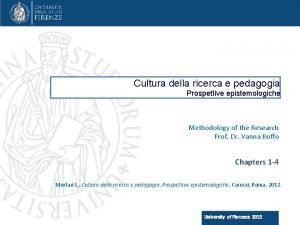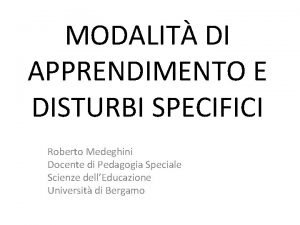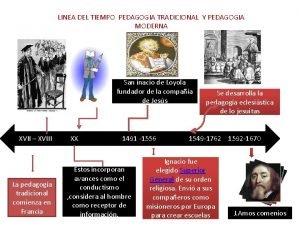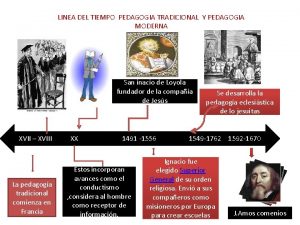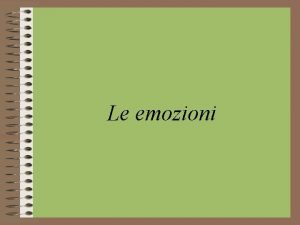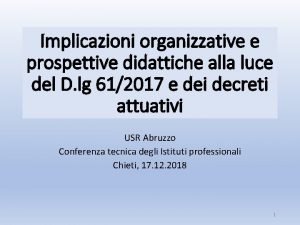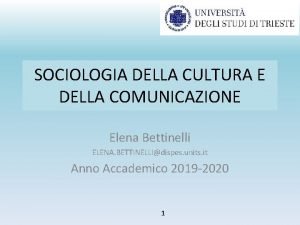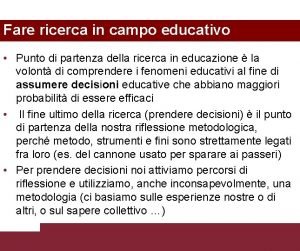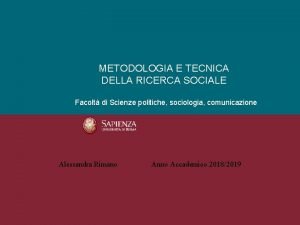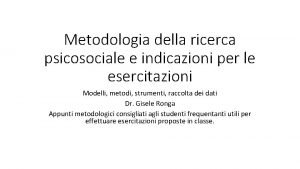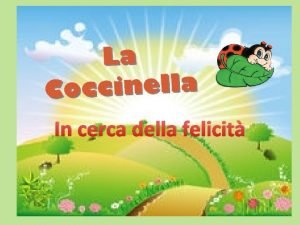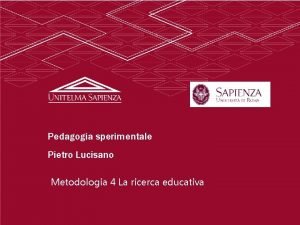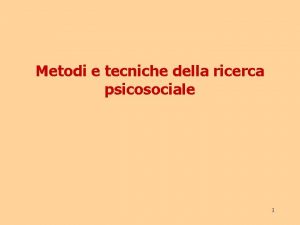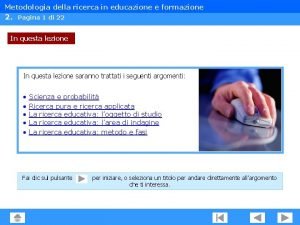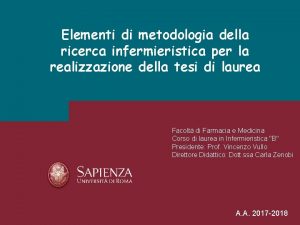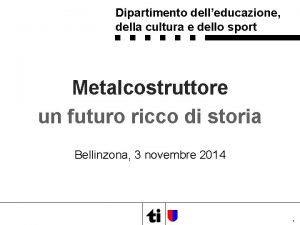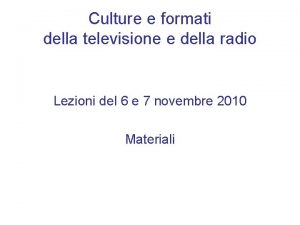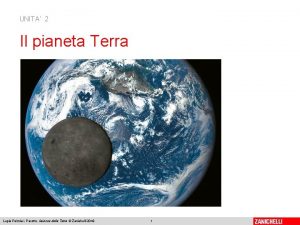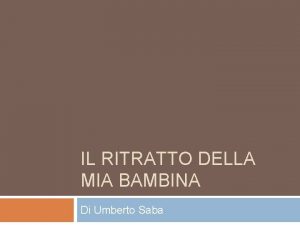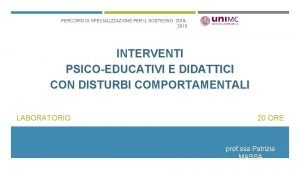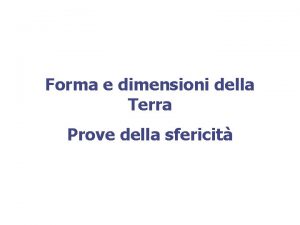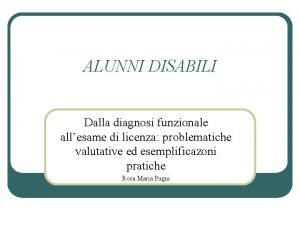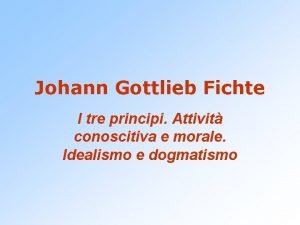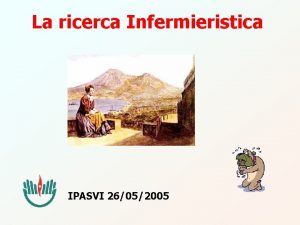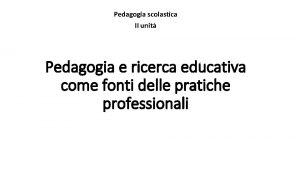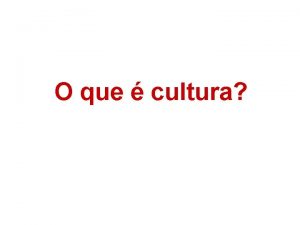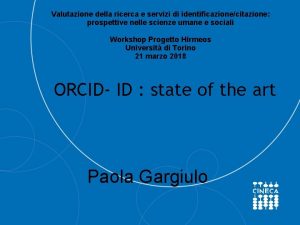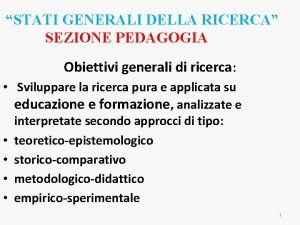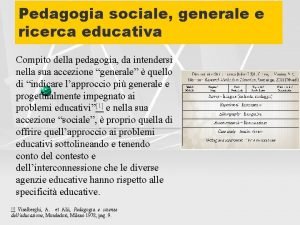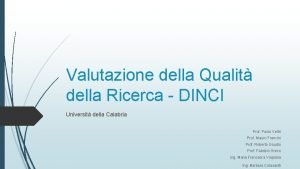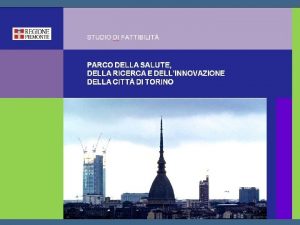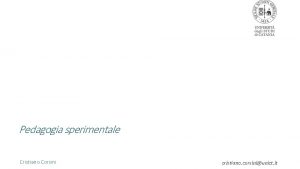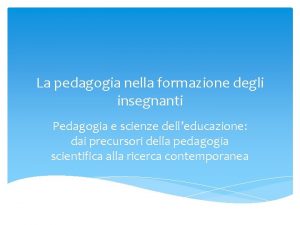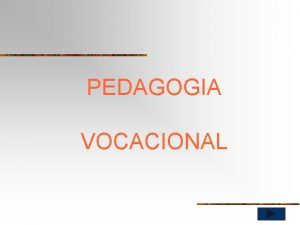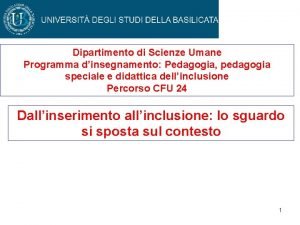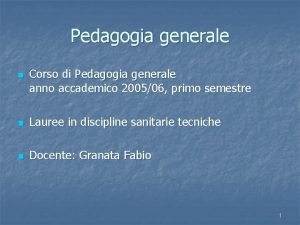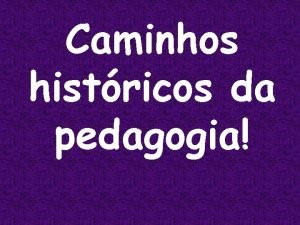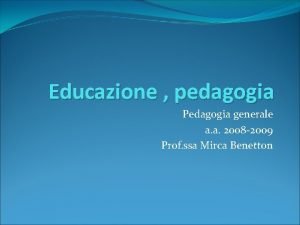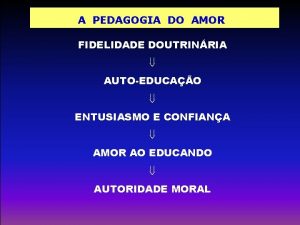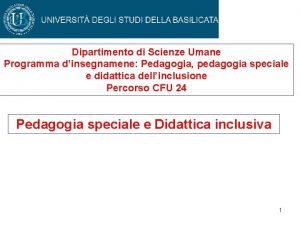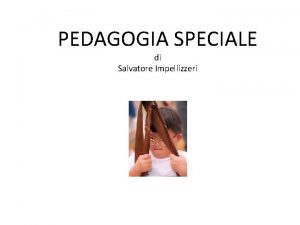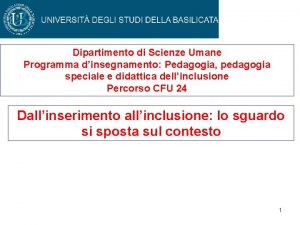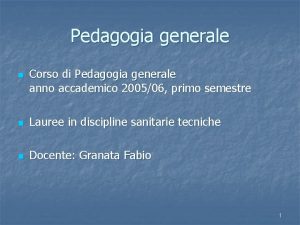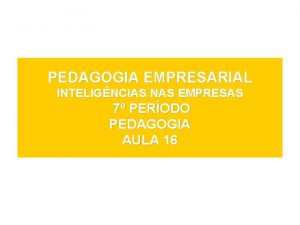Cultura della ricerca e pedagogia Prospettive epistemologiche Methodology































- Slides: 31

Cultura della ricerca e pedagogia Prospettive epistemologiche Methodology of the Research Prof. Dr. Vanna Boffo Chapters 1 -4 Mortari L. , Cultura della ricerca e pedagogia. Prospettive epistemologiche, Carocci, Roma, 2012. University of Florence 2015

The Problem of the Qualitative Research to day in Adult Education Why is it important to talk, to speak, to study about the Problem of the Research for each student both in Master Degree and in Ph. D Course? Exercise: Try to discuss each others for 2 minutes University of Florence 2015

1) The Research and its Methodology are at the base of the Contents, at the base of theory, at the base of the development of the Knowledge in Adult Education 2) The Research and its Methodology are part of the Lifelong Learning Course of every type of job 3) The Research and its Methodology give a good and deep framework to the Professionalization in Adult Education Work University of Florence 2015

Which types of Researches are there in Pedagogy/Adult Education? • Historical Research • Comparative Studies Research • Clinical Research • Sperimental Research • Empirical Research University of Florence 2015

Among this type of Which are typical for Adult Education? and Why? University of Florence 2015

The Qualitative Research Methodology The problem of qualitative research is situated into the Empirical Research and into Clinical Research and into Comparative Studies What is the Methodology of the Research? University of Florence 2015 6

INDEX 1 – Which paradigm for pedagogical research? 2 – Naturalistic epistemology 3 – Philosophies of the research 4 – Research methods University of Florence 2015

1 – Which paradigm for pedagogical research? • What is a paradigm? • Inquiry paradigms define: - what is the research about - what is its object - how to investigate it - what are procedures to decide the truth of knowledge - what is the scope of the research University of Florence 2015

1 – Which paradigm for pedagogical research? • The dominant paradigm - Scientific Revolution - Galileo Galilei - Renèe Descartes - Isaac Newton • Hard Sciences VS Soft Sciences • Crisis of the positivistic paradigm - Uncertainty Principle – Werner Heisenberg (1932) - Epistemological relation between subject and object University of Florence 2015

1 – Which paradigm for pedagogical research? • The Ecological Paradigm (Mortari 2012, pp. 31 -59) Ontological Assumptions Reality is… Gnoseological Assumptions Knowledge means… Epistemological Assumptions Reliable knowledge is ensured by… Ethical Assumptions Researcher’s responsabilities are… Political Assumptions Which research has to be done… University of Florence 2015

2 – Naturalistic epistemology - Naturalistic research happens in a natural setting Importance of the CONTEXT Phenomenon acquires significance relating to the context where it happens - Which implications for the role of the researcher? University of Florence 2015

2 – Naturalistic epistemology - Elements of naturalistic research - Qualitative methods - Participants Targeted sampling - Elaborate working theories - Inductive analysis of data - The “emerging design” of the research - Share and compare results • Tool of naturalistic research - Complexity of reality • Report of naturalistich research University of Florence 2015

Methodology 1. 2. 3. 4. 5. 6. Ecological Paradigm or naturalistic enquiry (Mortari, Bronfrenbrenner) Epistemology: general standards (parameters) to reach a reliable knowledge (naturalistic epistemology) Philosophy of the Research: direction of the sense of the research work (phenomenological, critical, hermeneutical) Methods of the Research: the processes of collecting and data analysis (grounded theory, narrative inquiry, phenomenological inquiry) Strategy of the Research: the path to guide the inquiry process (casestudy, action-research, ethnomethodology) Technique of Inquiry: tools for the date collecting (observation, interview, analysis of the conversation, collections of self narrative analysis, autobiographical data) University of Florence 2015

3 – Philosophies of the research - 3 philosophies of the research into the Ecological Paradigm a) Phenomenological b) Critical c) Participatory University of Florence 2015

3 – Philosophies of the research a) Phenomenological philosophy of the research * Lived experience at the centre of the discourse * The phenomenological style: - trascendental (descriptive) Husserl - hermeneutic (interpretative) Heidegger University of Florence 2015

3 – Philosophies of the research a) Phenomenological philosophy of the research - Essence of the phenomenological approach - Faithfulness to the phenomenon - Early experience - Epoché University of Florence 2015

3 – Philosophies of the research a) Phenomenological philosophy of the research - Fundamental cognitive acts - Open attention - No-look-for - Make-empty - Feel-lost - Epistemology of Hospitality - The phenomenological mean - A thought capable of feeling: empathy - Think yourself thinking: reflectiveness University of Florence 2015

3 – Philosophies of the research b) Critical philosophy of the research * Critical Theory – Frankfurt School - Horkheimer, Adorno, Marcuse, Fromm, Benjamin - Freire, Habermas, Foucault, Bloch * Emancipatory model VS Positivism - Society presents lots of asymmetries of power * Knowledge to transform society - Political responsability of the research University of Florence 2015

3 – Philosophies of the research b) Critical philosophy of the research * Epistemic principles: - Unmask the several forms of cultural power - The aim of the research is to transform society - Language as a form of power * Feminist Approach - Epistemology of differences University of Florence 2015

3 – Philosophies of the research c) Participatory philosophy of the research - Research has to be useful for participants - Not on people, but with people - Participants as co-researchers - Building up a Research Community - Sharing the process of meaning construction of experience University of Florence 2015

3 – Philosophies of the research c) Participatory philosophy of the research * Elaborate a local theory - No general value of theories - Transformative theories are strictly linked to context - Importance of insiders’ knowledge * Dialogue between insiders e outsiders - Co-generative dialogue between researchers and praticers - Mutual learning University of Florence 2015

4 – Research methods * Methodology and Methods * Relation Theory-Method - Inductive process VS Deductive process * 3 types of Method a) Grounded Theory b) Phenomenological-eidetic method c) Narrative Inquiry University of Florence 2015

4 – Research methods a) Grounded Theory «The Grounded Theory is a general method for comparative analysis […] and a set of procedures able to generate (sistematically) a theory founded [grounded] on data» (Tarozzi, 2008, p. 10) - General method - Sistematically - Generate a theory - Grounded Tarozzi M. , Che cos’è la Grounded Theory, Carocci, Roma, 2008. University of Florence 2015

4 – Research methods a) Grounded Theory * Inductive construction of the Theory - Identifying the area of investigation - Focus on the research problem - Data collection technique - Data analysis (Open Coding) - Elaborate core category University of Florence 2015

4 – Research methods b) Phenomenological-eidetic method * Psychological origins and nursing research application * Meaning of the lived experience, as well as it is perceived * Structural analysis of the essence of experience * The researcher is looking for the «essential invariant structures (essence)» (Mortari 2012, p. 170) University of Florence 2015

4 – Research methods b) Phenomenological-eidetic method * Phases of eidetic method: - Identify the phenomenon to be investigated - Identify participants who experienced it - Intensieve interview - Epoché * Process of data analysis: - Orizonalization - Clusters of meanings - General description University of Florence 2015

4 – Research methods c) Narrative Inquiry * Text approach: 1. Entering the text 2. Sense-making 3. Confirming 4. Presenting the account - Fidelity - Betweenness * The importance of narrative inquiry in the research University of Florence 2015

4 – Research methods c) Narrative Inquiry * Narrate experience key concept in pedagogy (Dewey) * Narrating gives substance to experience - Gather meanings - Reach non-explicit contents of consciousness University of Florence 2015

4 – Research methods Blending methods… (Mortari 2012, p. 193) - Method is not narrow, but flexible - Blend phenomenological-eidetic and grounded methods - Why it is epistemologically correct. . . - Sequential Actions & Longitudinal Actions University of Florence 2015

4 – Research methods a) Sequential Actions - Read descriptions - Find meaningful units - Elaborate a synthetic description - Assign a conceptual Label - Build up a network of meanings - Cross-analysis of descriptions and core meanings - Write an intense and general description University of Florence 2015

4 – Research methods a) Longitudinal Actions - Comparative dialogue with other researchers on the label - Buy off pre-insights - Continuous check on the descriptions - Write memos and reflections * Write a Research Report based on evidences University of Florence 2015
 Cultura della ricerca e pedagogia
Cultura della ricerca e pedagogia Roberto medeghini
Roberto medeghini Linea de tiempo pedagogia
Linea de tiempo pedagogia Pedagogia tradicional y pedagogia moderna
Pedagogia tradicional y pedagogia moderna Feedback periferico di james
Feedback periferico di james Prospettive didattiche/lisa
Prospettive didattiche/lisa Sociologia della cultura e della comunicazione units
Sociologia della cultura e della comunicazione units Mialaret fasi della ricerca
Mialaret fasi della ricerca Metodologia della ricerca sociale ecampus
Metodologia della ricerca sociale ecampus Metodologia della ricerca psicosociale
Metodologia della ricerca psicosociale La coccinella in cerca della felicità pdf
La coccinella in cerca della felicità pdf L'oggetto della ricerca educativa è:
L'oggetto della ricerca educativa è: Metodologia della ricerca psicosociale
Metodologia della ricerca psicosociale Sindefil
Sindefil Metodologia della ricerca infermieristica
Metodologia della ricerca infermieristica Metalcostruttori ticino
Metalcostruttori ticino Culture e formati della televisione e della radio
Culture e formati della televisione e della radio Prove sulla sfericità della terra
Prove sulla sfericità della terra Soluzioni il racconto della chimica e della terra
Soluzioni il racconto della chimica e della terra La bambina con la palla in mano
La bambina con la palla in mano Disturbo oppositivo provocatorio sostegno
Disturbo oppositivo provocatorio sostegno Soluzioni il racconto della chimica e della terra
Soluzioni il racconto della chimica e della terra Soluzioni il racconto della chimica
Soluzioni il racconto della chimica Il racconto della chimica e della terra
Il racconto della chimica e della terra Prove della sfericità della terra
Prove della sfericità della terra Attestato di credito formativo compilato
Attestato di credito formativo compilato Il racconto della chimica e della terra soluzioni
Il racconto della chimica e della terra soluzioni Il racconto della chimica e della terra
Il racconto della chimica e della terra 3 principi fichte
3 principi fichte Seta origini
Seta origini Il racconto della chimica e della terra 2 esercizi svolti
Il racconto della chimica e della terra 2 esercizi svolti Ricerca qualitativa e quantitativa infermieristica
Ricerca qualitativa e quantitativa infermieristica
